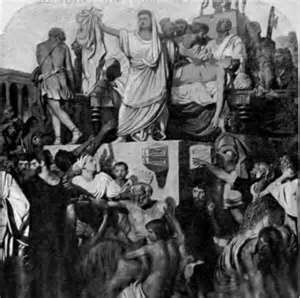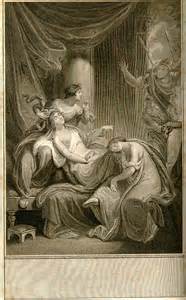Marc Antony
Marc Antony, whose Roman name was Marcus Antonius, was a Roman politician and soldier known for his allegiance to Julius Caesar and his love affair with Cleopatra. A one-time leader of the Roman Republic, he ended his career in defeat and a self-inflicted fatal wound.
He showed himself worthy in battles against the Gallic tribes, and Caesar lent his support to Antony's petitions to gain political office. He moved up the ranks, becoming the tribune of the plebeians in 50 B.C. The following year, when Caesar led his legions across the Rubicon, igniting civil war, Antony stood by Caesar and took command in Italy when Caesar went to Spain in pursuit of Pompey. Antony joined Caesar in Greece and commanded the right wing of Caesar's armies in the victory at Pharsalus.
Antony is well-known for two actions in the end of Caesar's story. On February 15, 44 B.C., during the festival of the Lupercal, Antony publicly offered Caesar a crown. Caesar demonstrably declined, the idea being that he did not intend to become a king. Rome was still a Republic at that point, and the tyranny of Rome's kings was still a horrific memory for most Romans. Antony is also well-known for the eulogy that he delivered after Caesar was murdered. (At the insistence of Brutus, the assassins had spared Antony and other of Caesar's supporters.) Antony turned the crowd against the assassins, chiefly Cassius and Brutus, and read out Caesar's will, in which Caesar had left most of his property to Rome's common people, not to his heirs. In the power struggle that followed the death of Caesar, Antony formed an alliance in 43 with Lepidus, who was Caesar's deputy dictator, and Octavian, Caesar's adopted son and heir, in forming the Second Triumvirate, an arrangement that gave its members ultimate power for five years. The following year, Antony joined with Octavian in hunting down Brutus and Cassius, leaving Lepidus to govern Rome. Caesar had spent a good deal of time in Egypt and had had an affair with the ruler, Cleopatra. Antony followed in Caesar's footsteps in more ways than one, falling in love with Egypt's last pharaoh at their first meeting in 41 B.C. Antony's liaison with Cleopatra created a rift with Octavian, which Antony patched up by agreeing to marry Octavian's sister, Octavia Minor. (Antony's wife, Fulvia, had died not long before.) As with the First Triumvirate before them, the members of the Second Triumvirate divided up Rome's provinces among themselves, with Lepidus getting Africa, Octavian getting Rome and the West, and Antony getting the East. It was to the East that he went after the Second Triumvirate was renewed for another five-year term. Antony went to Parthia in an attempt to succeed where Crassus had failed; but Antony, too, failed to secure Parthia for Rome, losing a great many men in the process. Meanwhile, back in Rome, Lepidus had attempted a power grab and had been thwarted by Octavian, who exiled Lepidus and then set out on a campaign to discredit Antony and take power for himself.
At the behest of Octavian, General Marcus Agrippa captured Methone, a Greek port loyal to Antony. This success and the presence of more Roman troops convinced Greece to switch allegiance from Antony to Octavian. The two triumvirs finally came to blows (figuratively, not literally) at the Battle of Actium, a rout that resulted in the destruction of nearly all of Antony's forces. Antony retreated to Egypt, and Octavian followed. Seeing no way out, Antony took his own life and died in the arms of Cleopatra, who ended her own life as well. |
|
Social Studies for Kids
copyright 2002–2026
David White



 Born into a wealthy, important family, Antony grew up knowing that his grandfather and father were consuls and that he was expected to follow in their footsteps. He followed a bit of a different path in his younger days, developing a reputation for gambling and carousing. In 58 B.C., when he was 25, he went to Athens to study philosophy and other scholarly subjects. The next year, he began a military career in Judea and Syria. He showed an ability on the battlefield and found his ultimate benefactor in Julius Caesar, who summoned him to become a staff officer in Gaul in 54 B.C.
Born into a wealthy, important family, Antony grew up knowing that his grandfather and father were consuls and that he was expected to follow in their footsteps. He followed a bit of a different path in his younger days, developing a reputation for gambling and carousing. In 58 B.C., when he was 25, he went to Athens to study philosophy and other scholarly subjects. The next year, he began a military career in Judea and Syria. He showed an ability on the battlefield and found his ultimate benefactor in Julius Caesar, who summoned him to become a staff officer in Gaul in 54 B.C. Ruling Rome alone, Caesar made Antony "Master of the Horse," a position that enabled him to rule when Caesar went to Spain to put down the last resistance by Pompey's supporters. However, Antony proved a poor ruler and Caesar had to put things right when he returned.
Ruling Rome alone, Caesar made Antony "Master of the Horse," a position that enabled him to rule when Caesar went to Spain to put down the last resistance by Pompey's supporters. However, Antony proved a poor ruler and Caesar had to put things right when he returned. Octavian summoned Antony to Rome to answer to a series of charges, including making a will that left his possessions not to his heirs by his Roman wives but to his children by Cleopatra. Antony remained in Alexandria with Cleopatra. In 31 B.C., the fighting between the triumvirs began.
Octavian summoned Antony to Rome to answer to a series of charges, including making a will that left his possessions not to his heirs by his Roman wives but to his children by Cleopatra. Antony remained in Alexandria with Cleopatra. In 31 B.C., the fighting between the triumvirs began.
